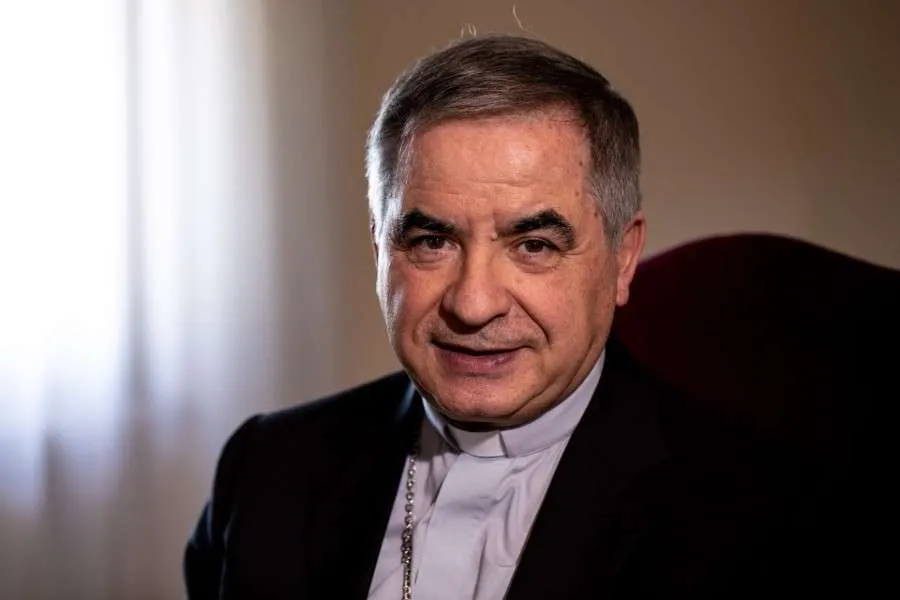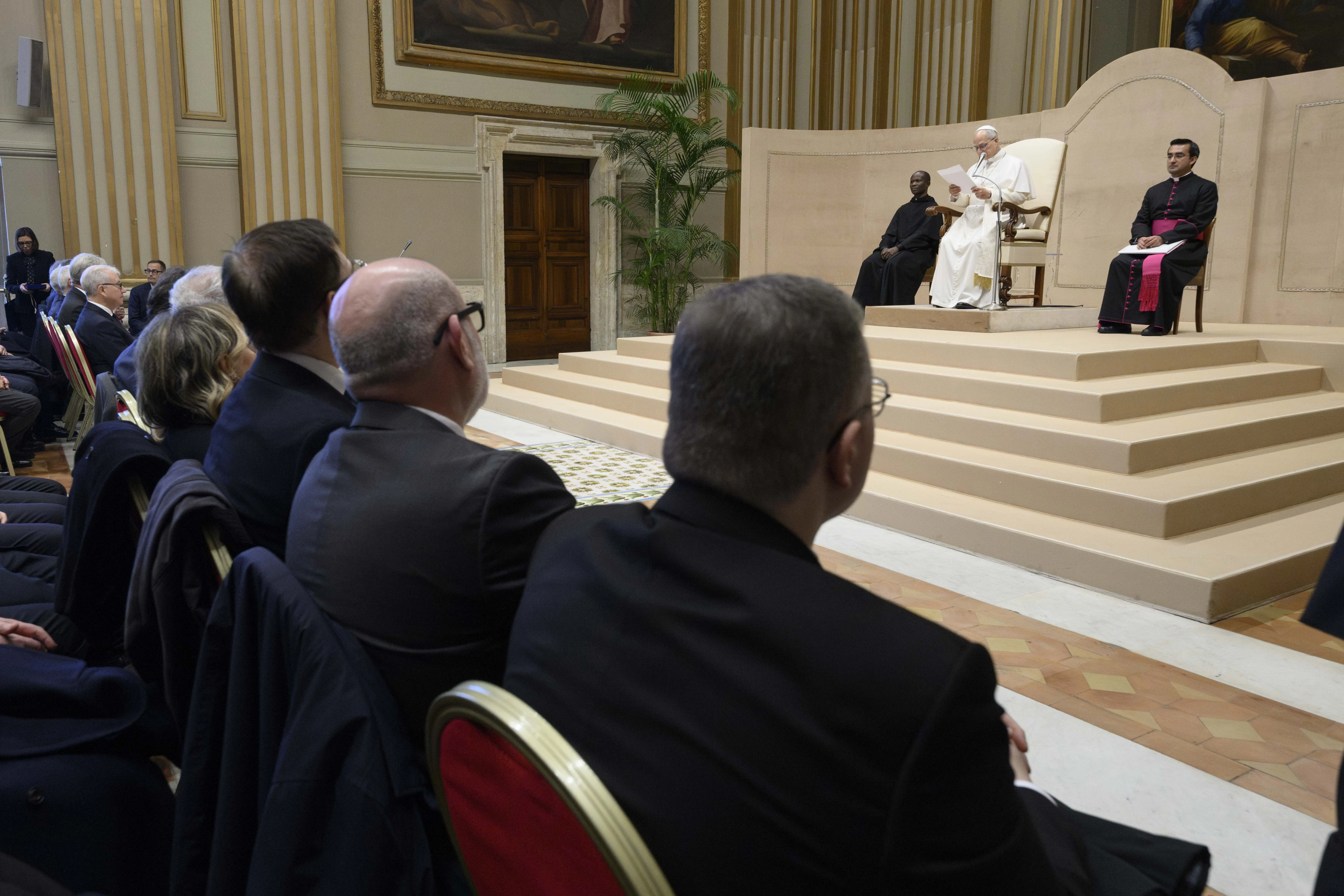Approximately 50 million of the purchase was offset by the foundation’s agreement to absorb some of the IDI’s outstanding debts, covered by a mortgage on the hospital’s real estate.
The additional 80 million was provided in cash by the Vatican.
Fifty million euros came in the form of the loan from the Administration for the Patrimony of the Apostolic See, even though that loan likely breached the bank’s operational policies, and left it open to scrutiny from European banking regulators.
Eventually that loan went bad, because hospital income could not pay it back.
Earlier this week, APSA’s head conceded that the Vatican central bank was forced to write off 30 million euros of the loan, after attempts to secure a $25 million grant from the U.S.-based Papal Foundation collapsed.
(Story continues below)
Officials at the Secretariat of State and APSA, reportedly spurred on by Becciu, asked Cardinal Donald Wuerl to request the grant from the Papal Foundation in 2017.
Trustees and donors expressed skepticism about the amount, which was far larger than its normal disbursements. Although Wuerl told the Papal Foundation board that the funds were intended to save the IDI from closure, lay board members raised questions about whether the cash was really intended to meet an operating shortfall at the hospital, or to cover the bad debt at APSA.
Despite those objections, the grant was ultimately approved by the Papal Foundation board in a secret ballot - sources inside the foundation told CNA that board members believe all but one of the bishop members voted for it, while all but one of the lay members voted against approving the grant.
Dispersal of the money stalled after the board continued to ask questions about the final destination of the funds.
Two initial installments were sent to Rome in late 2017 and early 2018, totaling $13 million. After internal disagreements about the grant went public, Cardinal Wuerl said he would ask the Vatican to cancel the request and return the funds. In early 2019, Cardinal Pietro Parolin, Vatican Secretary of State wrote to the board saying the $13 million would be reclassified as a loan, rather than a grant, and would be repaid.
Two sources within the papal foundation told CNA that the Vatican has proposed the loan be repaid through "discounts" applied each year to the list of grants requested of the Papal Foundation by Vatican offices.
“The poor will end up paying the debt,” a source close to the Papal Foundation told CNA.
Cardinal Versaldi
After the loan from APSA, the remaining 30 million euros the Vatican used to fund the purchase of IDI out of bankruptcy was, according to court-ordered wiretaps published in the Italian media, arranged by Cardinal Giuseppe Versaldi, who was placed in charge of the Fondazione Luigi Maria Monti.
While he was leading the partnership to buy the IDI, Versaldi was also serving as the president of the Prefecture for the Economic Affairs of the Holy See and was the Vatican’s delegate to oversee the Italian province of the Sons of the Immaculate Conception, which had been dragged into insolvency along with the IDI.
According to the wiretaps, in 2014 Versaldi arranged for 30 million euros to be diverted from the Bambino Gesu Hospital toward the non-profit he oversaw. That money came from a grant of 80 million euros the hospital received from the Italian government.
The wiretaps recorded Versaldi discussing the plan with Giuseppe Profiti, the president of Bambino Gesu, with the two agreeing to conceal the misdirection of the funds from Pope Francis.
Versaldi and Profiti both denied any wrongdoing, with the cardinal claiming he only wanted to spare the pope the technical details of the efforts to save the IDI.
Sources close to the efforts to fund the IDI purchase told CNA that Italian government officials declined to pursue the matter because of the involvement of high-ranking Vatican officials and because the funds were still going to be used for a hospital.
Cardinal Becciu and Fr. Decaminada
Although Becciu told CNA he had lost interest in the project by the time of the Papal Foundation grant, the cardinal’s connection to the IDI deal dates back at least to his 2011 appointment as the sostituto, the second ranking official, at the Secretariat of State.
Shortly after Becciu began working in that role, Fr. Franco Decaminada approached him for support on a proposal that the Vatican supply the IDI with 200 million euros, ostensibly to help it take over another hospital in Milan. The IDI was already teetering on insolvency by then.
Decaminada was then a senior member of the Sons of the Immaculate Conception, the order that then owned and oversaw the IDI. The priest served as the IDI’s president until its collapse.
In 2014, an Italian newspaper published details of a letter from Decaminada to Becciu, dated July 8, 2011.
But Becciu told CNA this week that he did not remember the proposal.
“In July of 2011 I had just taken up the position of Substitute and I don’t remember if Fr Decaminada wrote me, but I never dealt with this question.”
In September 2011, Decaminada hired Becciu’s niece Maria Piera Becciu, as his personal secretary.
CNA asked Cardinal Becciu if he or his position at the Secretariat of State had played any role in the hiring of his niece. He told CNA simply that “she applied for the position and was hired.”
Earlier that same year, Decaminada was involved in the creation of a company called Ibos II, with offices in Luxembourg, Kinshasa, and in Rome, where the office was located in the same building as the IDI. The company was set up to attract investments for oil and mineral prospecting along the border region of the Democratic Republic of Congo and Angola.
Before he returned to Rome in May 2011, Becciu had been apostolic nuncio to Cuba for two years; before that he was the Vatican’s ambassador in Angola for nearly a decade. In 2012, Becciu was involved in the Secretariat of State’s consideration of a reported $200 million investment in a different oil company in the Angolan region, Falcon Oil.
Becciu told CNA that he was not aware of the connection between Ibos II and IDI, and had never had any contact with the company.
Decaminada, who had a reputation for leaving the IDI’s offices near the Vatican with shoeboxes full of cash, was arrested in 2013. He was sent to prison for his part in the massive fraud and corruption around IDI’s collapse, and eventually laicized.
Ongoing scrutiny
In 2015, Pope Francis abolished the Prefecture for the Economic Affairs of the Holy See and appointed Versaldi to lead the Congregation for Catholic Education.
Profiti was later removed and convicted by a Vatican court following a scandal in which he abused his office at the hospital to launder funds for the renovation of an apartment for Cardinal Tracisio Bertone, the Vatican Secretary of State from 2006-2013.
In 2016, shortly after the IDI was bought out of administration, Archbishop Becciu was responsible for the cancellation of a planned external audit of all Vatican finances by the firm PriceWaterhouseCoopers. The following year, he was at the center of a complicated series of events concerning the Sovereign Military Order of Malta, in which the Secretariat of State was accused of siphoning off more than 30 million euros from a Swiss-based trust bequeathed to the Order.
The situation was resolved when the Order’s Grand Master, Matthew Festing, was forced to resign, and the pope named Becciu as a special delegate to oversee the Order.
Also in 2017, Becciu forced the resignation of the Vatican’s first-ever Auditor General, threatening him with prosecution for “spying” on the private financial dealings of senior Vatican figures, including Becciu himself.
In 2018, Pope Francis made Becciu a cardinal and appointed him to lead the Congregation for the Causes of the Saints.
In recent weeks, his time at the Secretariat of State has come under increasing scrutiny, following reports of his use of a Luxembourg-based investment fund to direct more than $200 million into a property development scheme in London, and he is believed to be at the center of a still-going internal Vatican financial investigation.








